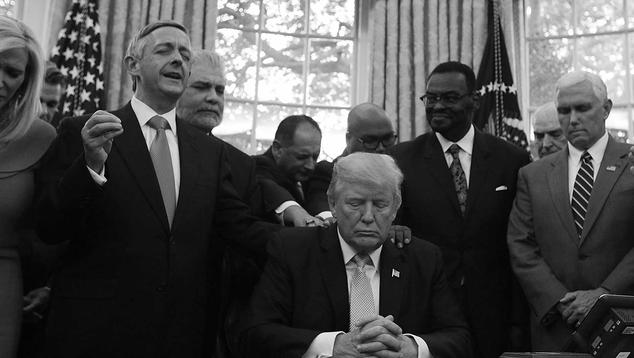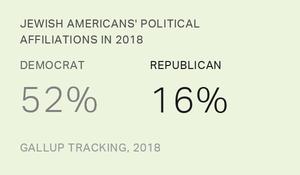One of the fascinating aspects of Donald Trump's presidency so far has been the stability of his support among Americans. His overall approval rating has varied little over his first 2 1/4 years in office. And, significantly, his approval rating has varied little among one of the most important segments of his base -- highly religious, white Protestants.
Support for Trump among this group (an approximation of what are sometimes called evangelicals) has been high and rock steady during the Trump presidency so far. White, highly religious Protestants gave Trump an average 67% approval rating in Gallup surveys conducted in 2017, and an average 69% approval in both 2018 and in the first quarter of 2019.
The president's overall ratings in 2017, 2018 and the first quarter of 2019 -- using the same polls from which the evangelical job approval ratings are calculated -- have been 40%, 41% and 40%, respectively. Given this overall stability, our default expectations are that Trump's ratings would be equally stable among subgroups, as has been the case for evangelicals.
There are a number of ways to determine who is or is not an evangelical, I should add. For this analysis, I'm using those who identify as white and Protestant, and who attend religious services weekly or almost every week. Pew Research, as another example, bases their definition on those who are Protestant and who also self-identify as born again or evangelical. Using that definition, Pew recently reported the same percentage of white Protestant evangelicals approving of Trump (69%) as our 2019 Gallup average.
Party Identification Supplants Evangelical Status
When my colleague, Jeff Jones, recently looked at Trump's approval among several demographic subgroups, he concluded that "Subgroup differences [in Trump approval] largely originate in the party orientation of those groups. Once party is taken into account, there is little to no variation among demographic or attitudinal subgroups."
We see this powerful influence of party identification in the case of highly religious, white Protestants as well. Once we know if a person identifies as a Republican or as a Democrat, we pretty much know what they will say when asked about Trump -- regardless of their classification as evangelical.
- 92% of Republicans who are highly religious, white and Protestant approve of the job Trump is doing as president (based on aggregated 2018 and 2019 data). But 87% of Republicans who are not in the highly religious, white, Protestant category approve of Trump, little different.
- Trump job approval is extremely low among Democrats, whether that Democrat is or is not in the highly religious, white, Protestant category. Some 6% of Democrats who are not evangelicals (i.e., white, Protestant and highly religious) approve of Trump, compared with a very similar 9% among Democrats who are evangelicals.
In short, Americans' self-identification as a Republican or as a Democrat is translated into almost universal approval or disapproval of Trump, regardless of classification as evangelical or not.
What about the impact of being an evangelical among independents -- those who do not initially identify as a Republican or as a Democrat? There is a difference. Independents who are highly religious, white and Protestant approve of Trump at the 59% level, compared to 34% approval among of independents who do not fit in the evangelical category.
But among these independents, it's still mainly party leanings that explain the fact that evangelicals are more likely to approve of Trump than non-evangelicals. When we look at those independents who are evangelical and lean Republican (again, based on an aggregate of 2018 and 2019 data), we find the predicted high levels of Trump approval (85%). When we look at independents who are evangelical and who lean Democratic, 7% approve of Trump.
In other words, the finding that independents who are evangelical are more likely to approve of Trump mainly derives from the fact that the majority of these independents lean to the Republican party, identification with which is highly related to Trump approval. More broadly, all of these results show that the significant majority of evangelicals who approve of Trump are either Republican or independents who lean Republican.
The Relationship Between Religion and Politics Is Not New
Much has been written about this relationship between religiosity and support for Trump. It's not a new phenomenon, as I pointed out in an analysis of the relationship between religiosity and Trump support back in 2017. I concluded then: "These patterns [more religious people approving of a Republican president] are pretty baked into modern-day politics. I don't imagine they are going to change dramatically going forward." The current analysis suggests that this indeed has been the case. Trump has not, to this point, disrupted the historical relationship among being religious, being Republican and supporting a Republican president.
One final point. Some have argued that evangelicals might approve of Trump's performance as president while disapproving of him as a person. Our data, however, show that highly religious, white Protestants' favorable views of Trump are basically identical to their approval of the job he is doing. There is little sign that evangelicals hold a disproportionately unfavorable view of Trump as a person while approving of his job performance. The only caveat here is that presidents most often have higher favorable ratings than job approval ratings, so the fact that Trump's favorable rating and his job approval ratings are identical could suggest a modest tendency for evangelicals to be less positive about Trump as a person than might be expected.




